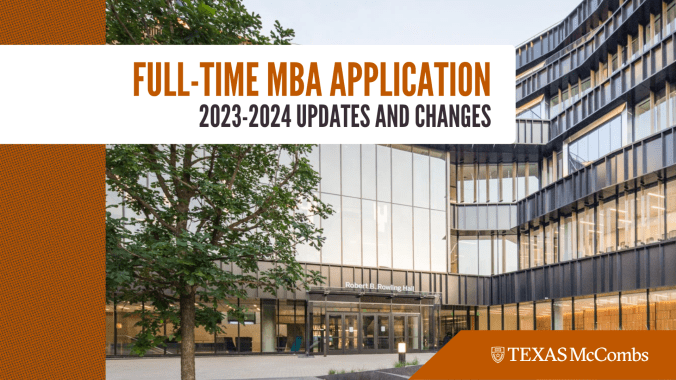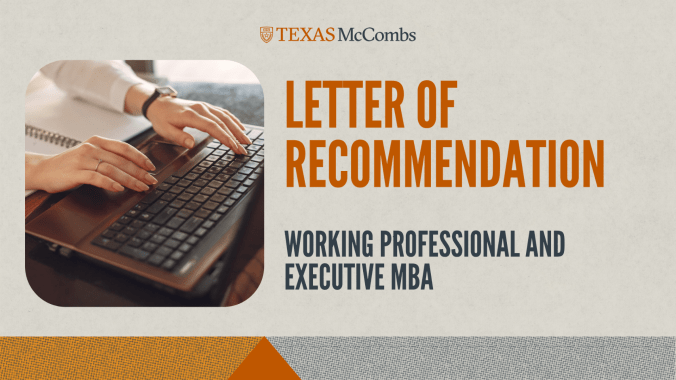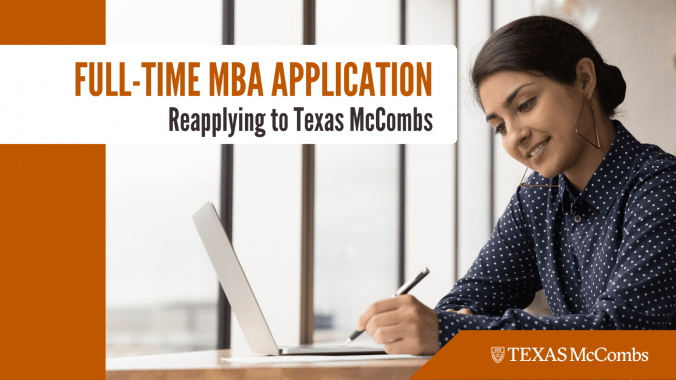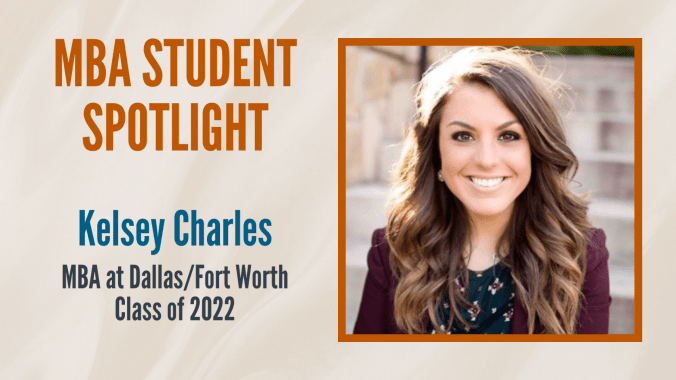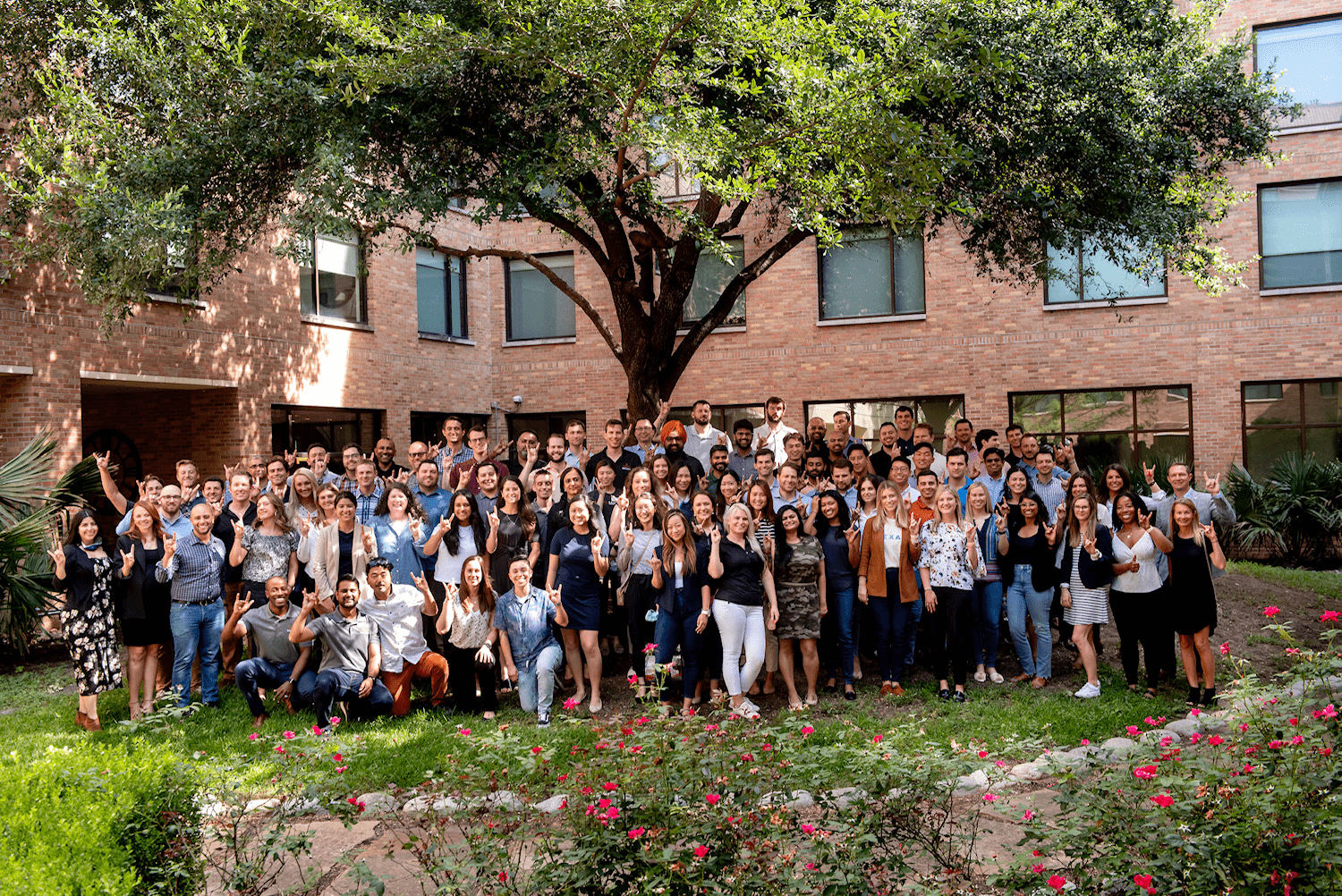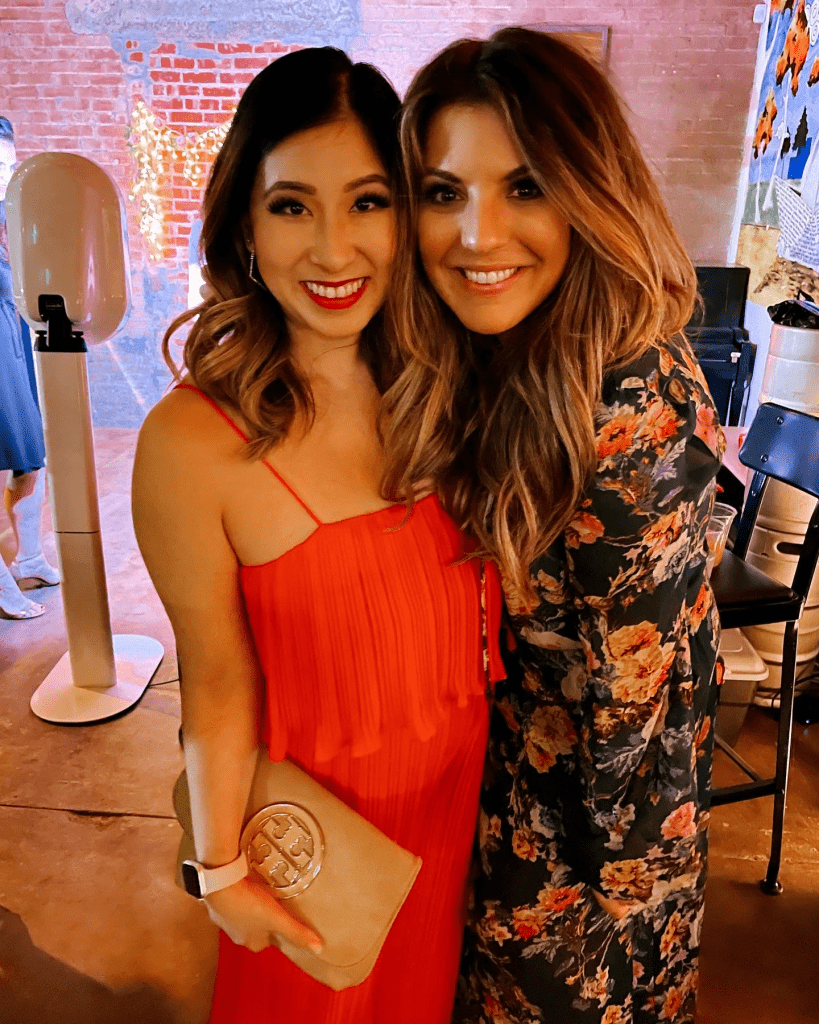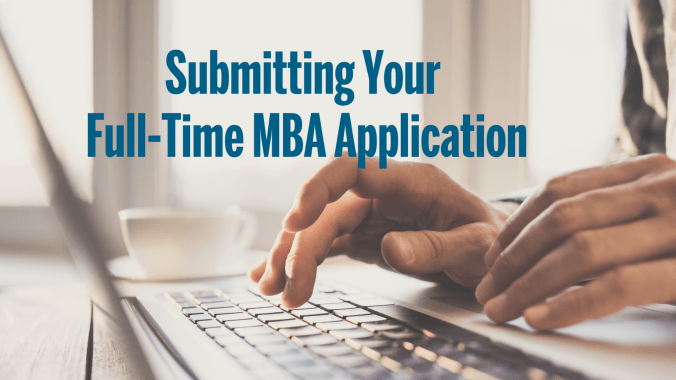Texas McCombs is delighted to unveil the 2023-24 Full-Time MBA application deadline and components, featuring significant updates that reflect our dedication to reducing bias, fostering inclusivity, and improving accessibility in the admissions process. We are excited to offer an extended application submission window, including our Round 4 deadline, providing applicants with more time to carefully prepare and submit their materials. Additionally, in recognition of the unique profiles of our applicants, we are expanding our standardized test options to include the GMAT Focus, GMAT, GRE, and Executive Assessment, and ongoing merit-based test waiver.
As part of our commitment to enabling applicants to showcase their unique voices, we are bringing back the video assessment component and introducing an optional peer interview, providing enhanced avenues for self-expression as well as authentic conversation. These updates aim to create an inclusive and welcoming admissions experience, ensuring prospective students have an equal opportunity to shine and contribute to our vibrant community at Texas McCombs.
APPLICATION COMPONENTS FOR THE 2023-2024 ADMISSIONS CYCLE
Our Admissions Committee dedicates itself to a meticulous, holistic review of each application. Our objective is to determine if you are a good fit for Texas McCombs and to be sure we are the right school for you and your goals. There are no fixed criteria or weighted portions of the application. Unless otherwise noted, the following application components will be required this cycle:
- Standardized Test (GMAT, GMAT Focus, GRE, Executive Assessment) or merit-based waiver
- English Proficiency Test (TOEFL, IELTS) or waiver (international students only)
- Undergraduate transcripts and graduate transcripts (if applicable)
- Resume
- One Professional Recommendation
- One Written Application Cover Letter
- Video Assessment
- Optional: Peer Interview
APPLICATION DEADLINES
Applications for the Full-Time MBA program are accepted in four rounds, and the program enrolls annually every August. Applications must be submitted by 11:59 PM Central Time on the deadline date for each round.
- Round 1: October 10, 2023
- Round 2: January 5, 2024
- Round 3: March 26, 2024*
- Round 4: May 9, 2024
*Final deadline for international applicants.
STANDARDIZED TESTING REQUIREMENTS
To provide MBA candidates with additional flexibility, applicants have more options than ever before when considering how to complete the standardized test requirement in their application. All applicants are required to submit a GMAT, GMAT Focus, GRE, or Executive Assessment (EA) score. We will waive the testing requirement if:
- Expired (taken 5+ years ago) GMAT, GRE, or EA score is submitted
- General Test Waiver (merit-based) is approved
Standardized exams like the GRE, GMAT, GMAT Focus, and EA help us to evaluate a candidate’s academic preparedness for the rigor of business school and is also one metric used to compare candidates within a large pool of applicants. However, there are some scenarios where a candidate’s application might shine without the standardized test. Learn more about the criteria required to apply for a general test waiver.
Once the GMAT Focus is launched in late fall, Texas McCombs will accept both the current GMAT test type and the new GMAT Focus test type.
Note that the majority of applicants applying to the Full-Time MBA program take either the GMAT or the GRE due to the competitiveness of the pool. In many cases, having a strong GMAT or GRE score will make you more competitive for both admission and scholarship opportunities.
APPLICATION COVER LETTER
The application cover letter is a critical means of learning who you are as an applicant and assessing your communication and writing skills. Here is the prompt to help guide you in writing the application cover letter:
Please write an application cover letter summarizing your aspirations, qualifications, and personal and professional experiences that make you a strong candidate for the Texas Full-Time MBA program.
LIMIT: 500 words
Additionally, and if applicable, applicants can provide an optional statement in the essay section of the application. Applicants should only provide an optional statement if there is something they wish to address about their candidacy that is not addressed elsewhere.
VIDEO ASSESSMENT
Texas McCombs has always been at the forefront of innovation and continuous improvement, consistently seeking new ways to enhance the application process for prospective MBA candidates. In line with our school mission and values, we introduced a dynamic video assessment component as part of the 2022-23 admission cycle, offering an alternative approach to a more traditional essay and interview format. Given all applicants will complete the video assessment, MBA candidates will have increased access to the application process and the opportunity to share their stories with us in their own voice. Through the video assessment, the Admissions Committee will have a chance to experience the “real” you, beyond a resume, test scores, and transcripts. Lastly, the video assessment will enable Texas McCombs to reduce bias in the admissions process by providing all applicants with a structured and consistent assessment experience.
MBA candidates with a submitted application, whose application fee has been paid or waived will be invited to take part in our Texas McCombs Video Assessment. Each applicant will have 7 days from the invitation to complete the assessment. The video assessment is asynchronous and will help the admissions committee evaluate your career goals and the following competencies that are crucial for the fit and success of our students within the program and their future careers:
Adaptability/Resilience
Empathy/Inclusivity
Ambition
Goals
Well-Roundedness
Verbal Communication
Professionalism/Poise
Each video assessment will start with a fun, non-evaluative question that will help the admissions team learn who you are as a person, then applicants will be asked 4 additional questions, for a total of 5 responses, with each response lasting no more than 90 seconds each. Detailed instructions will be provided with the video assessment invitation so you know what to expect, and applicants will have the opportunity to practice as many times as they wish before completing the final video assessment.
This is your time to show us your personality and enthusiasm! We recommend that you prepare for the video assessment similarly to how you might prepare for an interview. Think reflectively about your work experience, strengths, weaknesses, and work on your delivery.
OPTIONAL: PEER INTERVIEW
One of the most vital parts of the MBA application process at Texas McCombs is the human component – “Human-Centered, Future-Focused” is our mantra for a reason. We pride ourselves in getting to know you at a personal level during the admissions process and will continue to provide hundreds of virtual and in-person ways for you to meet our students, alumni, faculty, and admissions team.
We invite all MBA applicants to close out their application process in a human-centered way and complete a short, optional virtual interview. While not required, registering for and completing an interview is highly encouraged.
These interactive virtual sessions present a valuable opportunity for our applicants to connect with Full-Time MBA students, showcasing their collaborative skills, reaffirming their motivation for pursuing an MBA and leaving a lasting positive impression on Texas McCombs.
The optional interview will last 20-30 minutes and are available throughout the round. The student ambassador will introduce themselves and ask you up to 3 questions that focus on collaboration and your motivation. The rest of the time is yours to ask 2-3 questions that are top of mind.
OUR COMMITMENT
These enhancements to our application components exemplify our commitment to a human-centered, future-focused approach. We deeply value each candidate’s individual journey and recognize the potential they bring to our program. Join us at Texas McCombs as we shape a class of talented individuals with various perspectives, pioneering a path toward a brighter and more impactful future in business education.
Learn more about the MBA Application Components.
Visit Texas McCombs MBA to learn more about our programs and upcoming events, or take a peek into student life on Instagram. Check out our Application Process page for more information on application components. Please reach out to the MBA Admissions Team with any questions.
Good luck and Hook ’em!
